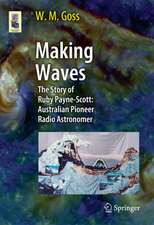Practical Work in Elementary Astronomy
Autor M.G.J. Minnaerten Limba Engleză Hardback – 31 iul 1969
| Toate formatele și edițiile | Preț | Express |
|---|---|---|
| Paperback (1) | 649.06 lei 6-8 săpt. | |
| SPRINGER NETHERLANDS – 20 oct 2011 | 649.06 lei 6-8 săpt. | |
| Hardback (1) | 595.02 lei 38-44 zile | |
| SPRINGER NETHERLANDS – 31 iul 1969 | 595.02 lei 38-44 zile |
Preț: 595.02 lei
Preț vechi: 743.78 lei
-20% Nou
Puncte Express: 893
Preț estimativ în valută:
113.86€ • 119.42$ • 94.78£
113.86€ • 119.42$ • 94.78£
Carte tipărită la comandă
Livrare economică 28 martie-03 aprilie
Preluare comenzi: 021 569.72.76
Specificații
ISBN-13: 9789027701336
ISBN-10: 9027701334
Pagini: 272
Ilustrații: XXIV, 247 p.
Dimensiuni: 210 x 297 x 20 mm
Ediția:1969
Editura: SPRINGER NETHERLANDS
Colecția Springer
Locul publicării:Dordrecht, Netherlands
ISBN-10: 9027701334
Pagini: 272
Ilustrații: XXIV, 247 p.
Dimensiuni: 210 x 297 x 20 mm
Ediția:1969
Editura: SPRINGER NETHERLANDS
Colecția Springer
Locul publicării:Dordrecht, Netherlands
Public țintă
ResearchCuprins
A. The Planetary System.- Space and Time, Instruments.- A1. The Stars around the North Pole.- A2. Some Autumn Constellations.- A3. Spherical Triangles.- A4. Sun-Dials.- A5. The Daily Rotation of the Earth.- A6. Conversion of Time.- A7. Simple Measurements with an Altimeter.- A8. Eccentricity of Graduated Circles.- A9. The Adjustment of a Telescope.- A10. To point the Telescope to a Star.- A11. Fundamental Measurements with the Meridian Circle.- A12. Reduction to the Meridian.- A13. The Sextant.- A14. Finding your Position at Sea.- A15. Parallax as a Measure for Stellar Distances.- A16. Precession, Aberration, Nutation.- A17. The Measurement of Astrographic Plates.- A18. To grind a Telescope Mirror.- A19. Optics of a Small Telescope.- The Motions of Celestial Bodies.- A20. The Orbit of the Moon.- A21. The Orbit of the Moon from Ephemeris Data.- A22. Lunar Eclipses.- A23. The Position of the Planets in their Orbits.- A24. The Orbit of Mars, as determined by Kepler.- A25. Geocentric Coordinates of a Planet.- A26. The Three-Body Problem.- A27. The Orbit of a Meteor.- A28. Passage of an Artificial Satellite.- Planets and Satellites.- A29. Topography of the Moon.- A30. The Shape of Lunar Craters.- A31. Photographic Photometry of the Moon.- A32. Observation of Planets through a Telescope.- A33. The Albedo of Venus.- A34. The Rotation of Saturn.- B. The Stars.- The Sun.- B1. The Size of the Sun.- B2. The Solar Constant.- B3. The Brightness Distribution over the Sun’s Disc.- B4. The Solar Spectrum.- B5. Profiles of Fraunhofer Lines.- B6. Profiles of Fraunhofer Lines (Correction and Interpretation).- B7. Equivalent Width of Fraunhofer Lines.- B8. The Curve of Growth.- B9. Sunspots.- B10. The Rotation of the Sun.- B11. The Solar Cycle.- B12. The Convection Cells of Bénard.-B13. The Shape of the Corona.- B14. Radio Bursts after a Solar Flare.- The Stars.- B15. To draw a Constellation.- B16. The Apparent Magnitudes of the Stars.- B17. The Diameter of Stellar Images as a Measure for the Brightness.- B18. Photoelectric Photometry of Stellar Images.- B19. The Atmospheric Extinction.- B20. Stellar Spectra.- B21. The Colours of the Stars.- B22. The UBV Photometric System.- B23. Interstellar Extinction.- B24. The Nearest Stars.- B25. The Motion of the Hyades.- B26. The Mean Light Curve of a Cepheid.- B27. The Observation of Double Stars.- B28. The Orbit of a Visual Binary.- B29. The Dynamical Parallax of Binaries.- B30. The Orbit of a Spectroscopic Binary.- B31. The Orbit of an Eclipsing Variable.- B32. The Observation of Star Clusters and Nebulae.- B33. Open Clusters.- B34. The Distribution of the Stars in a Globular Cluster.- B35. Cluster Variables in a Globular Cluster.- B36. The Apex of the Solar Motion.- B37. Preferential Directions in the Stellar Motions.- B38. The Milky Way.- B39. Dark Nebulae.- B40. The Spiral Structure of the Galactic Clouds, derived from 21 cm Measurements.- Index of Subjects.















